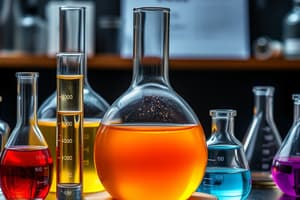Podcast
Questions and Answers
In the context of scientific research, what is the most significant role of critical thinking?
In the context of scientific research, what is the most significant role of critical thinking?
- To quickly generate solutions to complex problems without in-depth analysis.
- To evaluate evidence, identify biases, and formulate sound conclusions. (correct)
- To accept all scientific findings as equally valid without scrutiny.
- To reinforce existing beliefs and theories regardless of contradictory evidence.
Which element is LEAST crucial for effective communication of scientific findings?
Which element is LEAST crucial for effective communication of scientific findings?
- Detailed background information irrelevant to current results. (correct)
- Accurate presentation of results and data.
- Well-supported conclusions based on evidence.
- Clear and concise descriptions of methods used.
Why is it essential for scientists to consider ethical implications in their work?
Why is it essential for scientists to consider ethical implications in their work?
- To ensure experiments are conducted quickly to maximize output.
- To secure funding and promotions within their institutions.
- To avoid potential negative impacts and ensure responsible conduct. (correct)
- To minimize challenges to established scientific theories.
How does new evidence typically affect established scientific theories and models?
How does new evidence typically affect established scientific theories and models?
In what way do scientific inquiry and critical thinking intersect to promote reliable scientific outcomes?
In what way do scientific inquiry and critical thinking intersect to promote reliable scientific outcomes?
A researcher observes that a certain plant species consistently grows taller in sunny areas compared to shady areas. According to the scientific method, what is the most logical next step?
A researcher observes that a certain plant species consistently grows taller in sunny areas compared to shady areas. According to the scientific method, what is the most logical next step?
Which statement best differentiates between a scientific law and a scientific theory?
Which statement best differentiates between a scientific law and a scientific theory?
In an experiment examining the effect of fertilizer concentration on crop yield, a scientist uses different concentrations of nitrogen-based fertilizer on several plots of land, while keeping the amount of water and sunlight constant. What is the most critical control that the scientist should implement to ensure the validity of the results?
In an experiment examining the effect of fertilizer concentration on crop yield, a scientist uses different concentrations of nitrogen-based fertilizer on several plots of land, while keeping the amount of water and sunlight constant. What is the most critical control that the scientist should implement to ensure the validity of the results?
A researcher is studying the rate of a chemical reaction at different temperatures. Which SI unit is most appropriate for measuring temperature in this experiment?
A researcher is studying the rate of a chemical reaction at different temperatures. Which SI unit is most appropriate for measuring temperature in this experiment?
A complex systems model is developed to simulate climate change impacts on a regional ecosystem. What is the primary limitation of relying solely on this model for predicting future environmental conditions?
A complex systems model is developed to simulate climate change impacts on a regional ecosystem. What is the primary limitation of relying solely on this model for predicting future environmental conditions?
A scientist hypothesizes that increased carbon dioxide levels will lead to increased rates of photosynthesis in a specific algae species. Which experimental design would provide the most robust test of this hypothesis?
A scientist hypothesizes that increased carbon dioxide levels will lead to increased rates of photosynthesis in a specific algae species. Which experimental design would provide the most robust test of this hypothesis?
In a study, researchers found a strong statistical correlation between the consumption of artificial sweeteners and weight gain. What is the most appropriate conclusion that can be drawn from this study?
In a study, researchers found a strong statistical correlation between the consumption of artificial sweeteners and weight gain. What is the most appropriate conclusion that can be drawn from this study?
Which of the following scenarios best illustrates the application of the scientific method in addressing an environmental issue?
Which of the following scenarios best illustrates the application of the scientific method in addressing an environmental issue?
Flashcards
Scientific Inquiry
Scientific Inquiry
A systematic investigation into a question using evidence and logic.
Critical Thinking
Critical Thinking
Evaluating evidence, identifying biases, and forming conclusions.
Scientific Communication
Scientific Communication
Sharing research findings through publications and presentations.
Ethical Considerations
Ethical Considerations
Signup and view all the flashcards
Scientific Progress
Scientific Progress
Signup and view all the flashcards
Scientific Method
Scientific Method
Signup and view all the flashcards
Observation
Observation
Signup and view all the flashcards
Hypothesis
Hypothesis
Signup and view all the flashcards
Experimentation
Experimentation
Signup and view all the flashcards
Scientific Laws
Scientific Laws
Signup and view all the flashcards
Scientific Theories
Scientific Theories
Signup and view all the flashcards
International System of Units (SI)
International System of Units (SI)
Signup and view all the flashcards
Scientific Models
Scientific Models
Signup and view all the flashcards
Study Notes
Scientific Method
- Science is a systematic way of acquiring knowledge about the natural world.
- It relies on observation, experimentation, and the formulation and testing of hypotheses.
- The scientific method is a cyclical process involving these steps:
- Observation: noticing a phenomenon or problem.
- Questioning: formulating a specific question about the observation.
- Hypothesis: proposing a testable explanation for the question.
- Prediction: stating what will happen if the hypothesis is correct.
- Experimentation: designing and conducting an experiment to test the prediction.
- Analysis: interpreting the results of the experiment.
- Conclusion: drawing conclusions based on the analysis, supporting or rejecting the hypothesis.
Branches of Science
- Science is broadly categorized into various branches, each focusing on a specific area of the natural world.
- Some key branches include:
- Physics: studies matter, energy, and motion.
- Chemistry: studies the composition, properties, and reactions of matter.
- Biology: studies living organisms and their interactions.
- Earth Science: studies the Earth, its structure, processes, and resources.
- Astronomy: studies celestial objects and phenomena.
Scientific Laws and Theories
- Scientific laws describe patterns and relationships in nature that have been consistently observed.
- Scientific theories explain these patterns and relationships based on a broader understanding.
- Laws are generally expressed as mathematical equations or statements.
- Theories are more complex and may be revised or expanded as new evidence emerges.
Scientific Measurements and Units
- Precise and accurate measurements are crucial for scientific investigations.
- Standard units of measurement are used to ensure consistency and reproducibility of data.
- The International System of Units (SI) is the standard system of measurement used in science.
- Key fundamental units include: meter (length), kilogram (mass), second (time), ampere (electric current), kelvin (temperature), mole (amount of substance), and candela (luminous intensity).
Scientific Models
- Models are simplified representations of complex systems or phenomena.
- They are used to illustrate concepts, make predictions, and gain insights into the behavior of the real world.
- Models can be physical (e.g., a model of the solar system), mathematical (e.g., equations describing planetary motion), or conceptual (e.g., a diagram illustrating a biological process).
Scientific Inquiry and Critical Thinking
- Scientific inquiry involves a systematic investigation into a question using evidence and logic.
- Critical thinking is crucial in evaluating evidence, identifying biases, and formulating sound conclusions.
- Both are essential for proper interpretation of scientific data.
Scientific Communication
- Researchers share their findings through publications, presentations at conferences, and other forms of communication.
- This exchange of information is vital for the advancement of scientific knowledge.
- Effective communication requires clear, accurate, and concise descriptions of methods, results, and conclusions.
Ethical Considerations in Science
- Ethical considerations are essential in all scientific endeavors.
- Scientists need to be mindful of the potential impact of their work and ensure it is conducted responsibly and ethically.
- This includes issues like experimental design, data accuracy, avoidance of plagiarism, and data handling.
Scientific Progress and Change
- Science is a dynamic and evolving field.
- Scientific understanding is constantly refined and revised based on new discoveries and research.
- Old theories and models might be replaced by better explanations as new evidence emerges.
Studying That Suits You
Use AI to generate personalized quizzes and flashcards to suit your learning preferences.




